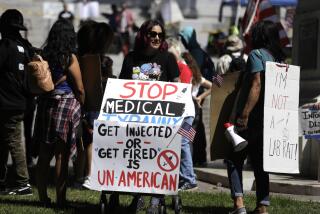Dr. Spock vs. the Sacred Cow
- Share via
Like millions of mothers, whenever I don’t know what I’m doing, I refer to Dr. Benjamin Spock. His “Baby and Child Care” book, a best seller second only to the Bible, is my bible.
So when I heard the news recently that he had joined a physicians group in cautioning parents about the dangers of milk, I was aghast. Flipping through his book’s indispensable index, I found “milk” somewhere between “midwives” and “moral values.”
“Milk is a very valuable food,” he writes on page 345. “Milk is the only food that contains a lot of (calcium). That is why you would like a child to average between 1 1/2 and 2 pints a day, in some form,” it says on page 361.
What was going on here? Why would the 89-year-old baby doctor join forces with the Physicians Committee for Responsible Medicine, a radical group with an animal-rights agenda, to indict the nutritional value and safety of milk?
Sure, Spock has been an activist his whole life, his biggest causes being the Vietnam War and nuclear disarmament. Sure, he was arrested five years ago for climbing a fence at the Cape Canaveral Air Force Station to protest the Trident II missile. But attack milk ?
What would be left for mothers to urge their children to drink in exchange for a cookie? (“Drink your warm cranberry juice” just doesn’t have the same ring.) Would any kid get within a foot of a McDonald’s broccoli burger, a solution cited by Neal Barnard, a psychiatrist and president of PCRM, to give kids their fix of calcium?
It takes about 1 1/2 cups of cooked broccoli or 3 cups of kale to equal the calcium in one cup of milk. If milk were not required or recommended in the school-lunch program, as PCRM advocated, what would be left? Just the bacon cheeseburgers and fries?
More important, where did this all leave me with my 1-year-old son, who has recently begun to drink cow’s milk, not to mention the scores of parents for whom milk is the embodiment of God, America and family values all poured into one?
So I called the doctor. Spock, that is. Obviously, my entree to him was as a reporter, but my concerns were as a mother.
“What should I do? Should I feed my son cow’s milk?” I asked him. A private consultation with Spock! I was certain that my son would never have a disciplinary or health problem again.
“I can’t say he shouldn’t be on milk,” he advised. “All I can say is, it’s not necessary.” It’s only in America and Europe that children continue to drink milk after they’re weaned, he continued. “But parents are easily terrified, easily made to feel guilty,” he said comfortingly. “I don’t want to condemn all parents whose children are drinking milk.”
Spock went on to say that his major aim is that parents refrain from feeding cow’s milk to children under 1 year of age, a widely agreed-to recommendation from the American Academy of Pediatrics.
He’d prefer that parents consult their own pediatricians after their children reach 1 year of age. Each child is different, he noted, in terms of allergic reactions to milk, family history of heart disease and predisposition to diabetes.
A few studies have shown a connection between diabetes and milk consumption, although Spock said it has not been well confirmed.
I began to think that in some ways he had been had, that he had been used by PCRM to advance its agenda for a vegan diet, that the group surely had known the impact of having the pediatric legend cast any aspersions on milk, such a sacred cow.
In fact, that’s why PCRM hooked up with Spock, who last year stopped eating dairy products himself. Since Sept. 6, 1991, “at 12 noon,” according to his wife, Mary Morgan, Spock--who was having chronic bronchitis, asthma and upper respiratory infections--has not been eating dairy products, on the advice of his physician.
Morgan said that she and Spock, who have been meditating twice daily for the last 17 years, now eat sea vegetables and other staples of a macrobiotic diet. Spock eats lots of leafy green vegetables and, she said, even fresh greens for breakfast. That’s fine when you’re 89 years old, but I just couldn’t imagine most children forgoing Kix for kale.
Nonetheless, Spock told me that he was very disappointed that the world had gotten the impression that he believed children should never drink milk. The gray areas had gotten lost in sharp headlines and 30-second sound bites.
While Spock was not promoting milk--he even said he would not be “as enthusiastic” about it in the next edition of his book--he was certainly not telling me to stop feeding it to my son.
He admitted that he did not embrace the more severe reservations the group has about milk consumption.
The message from this whole thing, it seems to me, is that milk shouldn’t be put on a pedestal. It shouldn’t be used instead of food, and parents shouldn’t have the false security that just because their kids drink milk, the parents don’t have to worry about giving their children variety in their diets. Nor should they force their kids to drink it if they can’t stand it.
But mostly, I think the hoopla scared parents unnecessarily. The criticisms weren’t anything new. Yes, we all agree that cow’s milk shouldn’t be fed to children under 1 year of age. Yes, we know some people can’t digest the lactose in milk; that some people are allergic to it; that in some cases milk proteins may exacerbate colic in babies. For kids and adults who can tolerate it, though, it provides a lot of nutrients.






